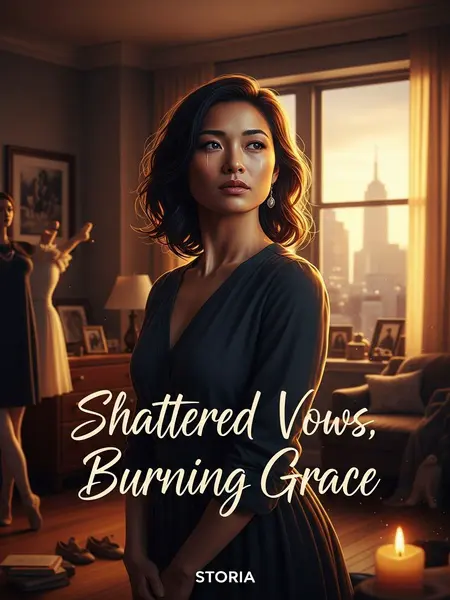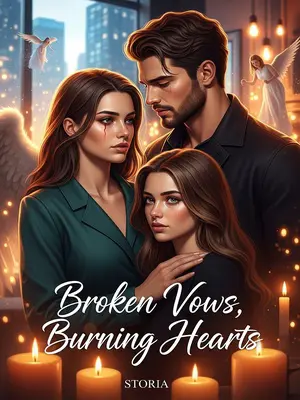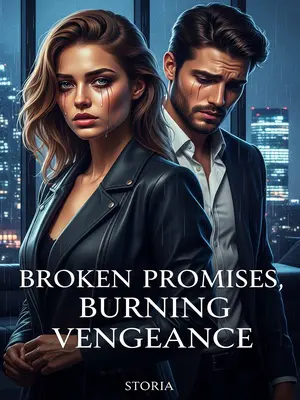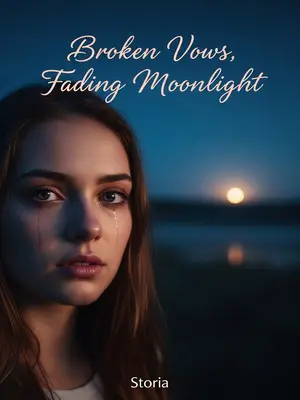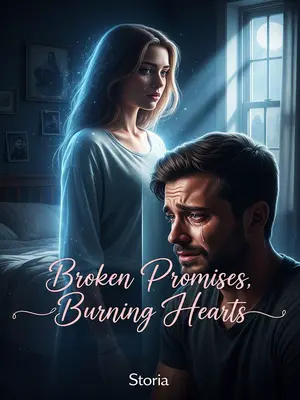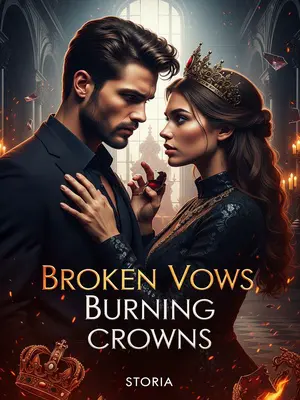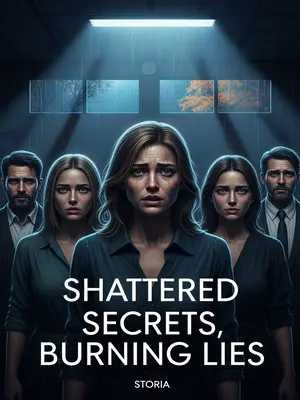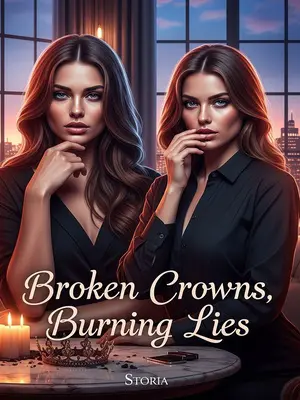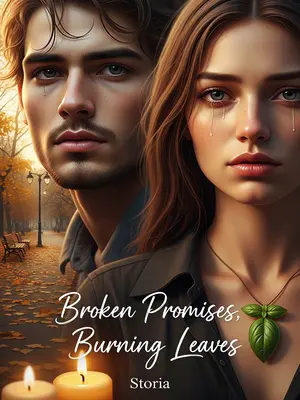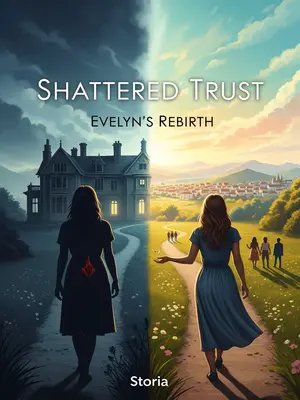Chapter 5: Relearning the Light
Our relationship improved a little after we stayed at the Whitaker estate for a night. For appearances, he had to sleep in the same bed as me. I figured he’d keep his distance. But that night, my mother-in-law’s soup had a lot of extra “herbs” in it—if you know what I mean.
The old house was grand, all dark wood and heavy drapes. Dinner was stiff and formal. Afterward, his mother insisted we try her “special family recipe” soup. I tasted something weird in the broth but kept quiet. That night, everything changed.
Graham said, "Sorry." Then, "Is this okay?" And finally, "If you’re uncomfortable, just say stop."
He was gentle, almost painfully so. Every move was hesitant, every word a question. I wanted to reach out, to bridge the gap, but I couldn’t.
I held out as long as I could before finally whispering, "...Sorry, I think it’s too much."
My voice was barely there. I felt raw, exposed. The silence that followed was thick, full of things we’d never say.
"Sorry," he apologized right away.
He looked genuinely sorry, regret flickering in his eyes. I wanted to comfort him, but I didn’t know how.
"It’s okay," I replied, forcing a smile.
I tried to make it easier for both of us, but the awkwardness lingered, heavy as ever.
...
Much later, I couldn’t help but ask, "Why haven’t you stopped yet?"
The question slipped out before I could stop it. He hesitated, looking down at the sheets, then finally met my eyes.
Graham finally looked up at me. Under the dim light, he seemed unsure, but he still leaned in and kissed me.
It was a soft, hesitant kiss. I let myself lean into it, just for a moment, wishing things could be different. Wishing I could be someone else.
Much later, I learned why he lost control that night. Savannah had started dating someone abroad. That night was the day she announced it to the world.
It all made sense in a twisted way. The news had hit him hard, and I was just... there. A stand-in for the woman he couldn’t have. I tried not to dwell on it, but it stuck with me, bitter and sharp.
When I found out I was pregnant, I messaged Graham. I just sent him the ultrasound from the OB. He took forever to reply: [Congratulations.]
I stared at the message, not sure what to feel. No excitement, no joy—just a word, like I’d told him the trash was out.
Five hours later, he finally realized something. [Chase Bank] Your account ending 730 has received $500,000.00, balance $650,123.00.
The money landed with no explanation, just another transaction. I closed the app, feeling more alone than ever.
[Thank you for your hard work.]
His message was stiff, almost like an HR email. I read it twice, looking for warmth. There was none.
Half a year later, our son, Mason Whitaker, was born. Graham treated him well, even setting up a trust fund for his education, healthcare, and everything he’d ever need.
Mason was beautiful—dark hair, big eyes. Graham held him with surprising tenderness, his hands gentle and sure. He arranged for the best of everything. I watched from the sidelines, grateful but always aware I was the third wheel in my own family.
The days crawled by. People knew Graham was married, but no one knew much about his wife. Aside from our late-night routine, we barely spoke. We never fought, we were polite. But close? Not even a little.
Our lives settled into a rhythm—separate but parallel. We shared a house, a child, a bank account. But the space between us was as wide as ever. Sometimes I wondered if we’d ever really known each other at all.
At three in the afternoon, I picked up Mason from preschool and brought him home. When I opened the door, Savannah was sprawled on the sofa, hugging the family golden retriever and grinning at me.
The house was full of laughter—Savannah’s laughter, bright and infectious. She looked up, her smile huge, the dog flopped across her lap like a spoiled baby. For a second, it almost felt like home.
"You’re back?"
Her voice was light, teasing. She waved at me with one hand, the other tangled in the dog’s fur. I set Mason’s backpack down, feeling like a stranger in my own house.
Mason, usually so serious, lit up. "Auntie!" He was obsessed with Savannah. Ever since he saw her dance, he’d been her biggest fan.
He ran to her, arms wide, nearly tripping over his own feet. Savannah scooped him up, spinning him around while he squealed with delight.
Savannah ruffled his hair and shot me a grin. "Sis, your son likes me better."
She was teasing, but it stung. I laughed, trying to brush it off. It was true—Mason adored her, looked at her the way he never looked at me.
Mason, wise beyond his years, looked up at her, eyes shining. "Auntie, can you just live with us and not leave?"
His words were so sincere, so hopeful. I felt a sharp pang of jealousy and guilt. Maybe I’d failed him.
I carried the groceries into the kitchen, Savannah’s laughter trailing after me. It echoed through the house, bright and clear. I busied myself, trying to ignore the ache in my chest.
"If I live here, where will your mom go?"
Savannah’s voice was playful, but the question hung in the air. I paused, waiting for Mason’s answer.
"She can leave," Mason said. "She’s not much use here anyway."
His words landed like a slap. I froze, staring at the apples in my hands. The room went cold. The noise from the living room faded into a dull hum.
...
The water was running in the kitchen sink. Suddenly, the door swung open.
I jumped, startled. I turned, expecting Savannah, but it was Graham. He looked tired, his suit jacket slung over one arm, dark circles under his eyes.
Graham stood there, looking a little worn out. "Can I come in?"
His voice was softer than usual, almost shy. I nodded, stepping aside.
"Yes, what is it?"
I tried to keep my voice steady, not wanting him to hear how rattled I felt.
He pointed to the pot on the stove. "The soup smells great. Can I have some?"
There was a hint of nostalgia in his tone, like he remembered something good. I nodded, grabbing a bowl.
"Of course," I said, my voice softer. I’d made it for him anyway.
The words slipped out before I could stop them. I ladled the soup, careful not to spill, and handed it to him with a small smile.
I handed him the bowl.
Our fingers brushed for a second. I thought he might say more, but he just nodded and turned away.
Graham took it. "Thanks for your trouble. Thank you."
He looked at me, his eyes a little softer than usual. I wondered if he meant it, or if it was just another polite phrase. Did he ever really mean it?
When I walked out, I saw Savannah grinning at me. She said, "Sis, your soup is as delicious as ever."
She cradled the bowl, savoring every spoonful. Her eyes sparkled with real delight. For a second, I felt proud.
I was stunned to see the bowl I’d just given Graham now in Savannah’s hands. She drank and sighed, content: "I really envy you for being able to cook. I’ve never even been in a kitchen."
The realization hit me. I forced a smile, nodding politely. Savannah had always been the star. I was just the one who made soup.
Mason chimed in, "Auntie, you’re so good at dancing, it’s okay if you can’t cook. Just let my mom cook for you."
He meant it kindly, but it only made the gap between us feel bigger. I swallowed hard, blinking fast.
All along, Mason had been spoiled by the Whitaker family. I was the only one who set boundaries, who didn’t let him get away with everything just because of his last name. Mason never liked me for it. He was just like his father—only caring about what or who he liked.
It was lonely, being the one who set the rules. I tried to teach Mason right from wrong, but it just pushed him further away. Was I doing the right thing? Or just making it worse?
Savannah wasn’t wrong. Not just my husband, my son—even my dog liked her more than me. That’s when I decided to get a divorce.
The thought had been simmering for a while, but right then, it solidified. I couldn’t keep living like this—unseen, unappreciated, always second best. I deserved more. Didn’t I?
I brought up divorce to Graham a week later at night. We’d just finished. He said he had to go out soon, but I cut him off, saying I had something to say too.
The timing was awkward, but I couldn’t wait anymore. I sat up, wrapped the covers around me, and looked him in the eye.
As I expected, he didn’t react. He just zoned out for a bit, then pulled away from me, face blank.
His face was a mask, totally unreadable. I waited, hoping for something—anything—but got nothing.
"Okay. Got it."
He said it quietly, almost to himself. Like he’d been expecting it all along.
Like he was just getting a message from his secretary.
The thought made me smirk, bitterly. Our marriage had always been a business deal. One more thing to check off the list.
I said, "I don’t want custody of our son either. He’ll be your responsibility from now on."
The words were flat, but I meant them. Mason would be better off with Graham, surrounded by people who doted on him. I didn’t want to fight.
"That’s fine."
He nodded, like we were talking about office supplies. I felt relief, but sadness too. Was it really this easy?
I insisted, "You’ve worked hard these past few years. Thank you."
It was the only thing left to say. For all our problems, he’d always done his part.
There were no feelings left between us, but he still had to sleep with me for years; it must have been hard for him too.
The thought made me laugh quietly. We’d both been trapped. Maybe now we could finally be free.
I didn’t have much to pack—one suitcase was enough for all my things. The divorce agreement sat on the living room table, already signed. Before leaving, I turned back and checked the lock one last time.
The suitcase was light. I looked around the living room one last time, the divorce papers sitting there. It felt unreal, like walking out of a movie. I paused at the door, double-checking the lock, as if that would make leaving any easier.
Graham, shirtless and covered in scratch marks, stood on the balcony, smoking.
It was almost poetic—him alone in the dark, city lights flickering behind him. The smoke curled around him, hiding his face. I watched for a second, then turned away, shutting the door behind me for good.
I didn’t tell anyone about the divorce. Mason was asleep in his room. At the Lin house, my parents were celebrating Savannah’s birthday. When Graham finished his cigarette, he’d go find Savannah, bringing the gift he’d picked out—a custom red dance dress. I’d liked it too, the first time I saw it. But just like this marriage, it was never meant for me.
The house was quiet, the only sound the clock ticking in the hall. I pictured Graham slipping out, the red dress in hand, heading to Savannah. Would she know what it meant? I thought about all the things I wanted that were never really mine.
No one remembered that as a kid, I’d also won the National Youth Dance Competition trophy. Teachers said I had a once-in-a-generation talent. But after I fell from the stage, I couldn’t dance anymore.
The memory was sharp. The lights, the applause, the sudden fall. I woke up in the hospital, dreams shattered. The trophy gathered dust, a reminder of what I’d lost.
After that, I locked myself in my room every day and cried until I couldn’t anymore. It was the worst time of my life. My parents were sad for a while, but soon after, they sent Savannah to the same teacher.
Their sympathy didn’t last. “If the older sister has talent, maybe the younger sister has even more,” they said. I watched from the sidelines as Savannah took my place, my pain replaced by her success.
"If the older sister has talent, maybe the younger sister has even more."
The words echoed in my head. I avoided the dance studio, the music, everything. I built walls around my heart and never let anyone see the hurt.
From then on, I couldn’t bear to look at anything related to dance.
I boxed up my leotards, hid my trophies, refused to watch recitals. Dance became a wound I couldn’t touch, a reminder of everything I’d lost.
Tonight, like so many nights before, was just an ordinary night. The breeze was soft, the moon was bright. From deciding to leave to boarding the plane, I never looked back.
The city lights blurred as the plane took off, the world shrinking below me. I stared out the window, letting the engine’s hum drown out my thoughts. I didn’t cry. I didn’t look back. I just let myself drift, finally free.
After boarding, a pretty flight attendant brought over a small cake. "Dear Madam, thank you for choosing our airline. The entire crew wishes you a happy birthday."
Her smile was warm, genuine. I blinked, surprised, then managed a laugh. “Thank you,” I said, accepting the cake. It was a small gesture, but it made me feel seen.
I was a little surprised, then smiled at her. "Thank you."
I took a picture of the cake, posting it to my story: “New year, new beginnings.”
The place I chose was my grandmother’s house in the countryside. After the plane, I still needed to take a train and then a shuttle. In recent years, Grandma’s town had become a tourist spot, with buses every day.
The trip was long, but comforting. The city faded to hills, the air grew fresher. The bus was full of tourists, all chattering about the views. I leaned against the window and let it all wash over me.
After five or six hours, the shuttle wound up the mountain road. I looked out the old glass window—white clouds rising from the ground, wind and heat rushing in. I snapped a few photos and posted them on Instagram.
The road twisted and turned, the sun glinting off the bus. I rolled down the window, letting the wind tangle my hair. The mountains were beautiful, the air thick with wildflowers and earth. I felt lighter, like I’d left all my troubles behind.
Suddenly, my phone rang, cutting through my peace. It was Graham.
The screen flashed his name, the sound jarring in the quiet bus. I hesitated, thumb hovering over the button, then sighed and answered.
"What is it?"
My voice was sharp, but I didn’t care. This was supposed to be my escape.
"Mason has a fever. Do you know where the medicine box is?"
His voice was tense. I pictured him pacing, worry written all over his face.
"Upstairs hall closet."
I kept it short, not wanting to get pulled in.
"Okay."
There was a pause, footsteps in the background. I tapped my fingers on the window, waiting.
After a pause, Graham added, "Found it. Thank you."
His words were softer, almost grateful. I felt a pang of guilt, but pushed it away.
"You’re welcome."
I was about to hang up when he stopped me.
Just as I was about to hang up, Graham continued, "Say hi to Grandma for me. Come back when you’ve had enough fun. Mason keeps calling for you."
I hesitated, the longing in his words catching me off guard. For a second, I almost softened. Then I remembered everything else.
I held my phone. "Then you should tell him we’re already divorced."
The words came out cold, final. Silence on the other end.
There was a click—sounded like Graham lighting a cigarette. His tone was calm: "Is it because of Caleb Sutton?"
The question threw me. I frowned, trying to remember the name. It sounded familiar, but distant.
"Caleb Sutton?" I repeated, confused. "What does he have to do with anything?"
My patience was running thin. I didn’t want to play this game.
"He’s back in the States," Graham said. "You two have the same IP location now."
The accusation was absurd, classic Graham. I rolled my eyes and rubbed my forehead.
"Graham," I sighed, "you don’t sound very clear-headed right now. I don’t know what you’re talking about, and I don’t want to."
I could hear my own exhaustion, the need to draw a line between us for good.
"If you can’t find something, ask the housekeeper. If you’re sick, take the kid to the doctor. From now on, let’s stay out of each other’s lives."
The words were final. I waited for him to argue, bracing myself.
Graham was silent for a moment. "Fine, as you wish."
His voice was flat, resigned. I hung up and let out a shaky breath. The bus rumbled on, carrying me farther away.
When I got to my grandmother’s house, I felt excited. The town had changed, but kept its charm. The familiar yard, the grape trellis, the creek…
The air was thick with nostalgia. I pulled my suitcase up the gravel path, breathing in the lilacs and cut grass. The old swing still hung from the oak. For the first time in forever, I felt at peace.
But—there was a stranger at the door. He was young, black T-shirt, silver bone necklace, hair damp from a shower.
He looked up, eyes widening. I slowed, heart pounding.
I pushed my suitcase, watching him. As we got closer, we both realized at the same time and blurted out:
"Caleb Sutton?"
"Autumn Lin?"
We both laughed, the tension breaking. It felt surreal, running into an old friend so far from where we started.
What a small world. Coming home, I’d run into an old teammate from my competition days.
Memories rushed back—late-night rehearsals, inside jokes, the thrill of the stage. Caleb always made me laugh, pushed me to do better. I felt a wave of gratitude and nostalgia.
In the years after I gave up dancing, Caleb kept going. After college, he went abroad like Savannah. I’d seen their posters. Graham knew his schedule because of Savannah—they were in the same company.
It was strange, seeing our lives cross again. Caleb looked older, more confident, but his smile was the same. We caught up fast, swapping stories and memories.
Caleb said that after coming back to the US, he wanted to create a unique American folk dance. Since my grandma’s town was famous for its heritage, he’d come here for inspiration.
His eyes lit up as he talked, his passion contagious. I found myself smiling, caught up in his excitement. For the first time in a long while, I felt hopeful.
After a brief chat, Caleb asked, "Autumn, all these years… have you tried dancing again?"
His question caught me off guard. I hesitated, searching for the words.
I was silent for a moment.
The pause stretched, heavy with old regrets. Caleb waited, patient, his eyes kind.
He went on, "I met a doctor abroad who specializes in this kind of rehab. Autumn… if you still want to dance, do you want to give it a shot?"
His voice was gentle, encouraging. I felt a lump in my throat. The idea was scary, but thrilling.
"The success rate isn’t 100%," he added, "and it might be expensive. If you need, I can… lend you the money."
He looked away, embarrassed. I could see the worry in his eyes, the hope I wouldn’t take it the wrong way.
Worried he’d said too much, Caleb looked at me nervously.
I smiled, grateful for his concern. It had been a long time since anyone cared enough to worry about me.
"Of course, if you don’t want to, just pretend I never brought it up."
He hurried to reassure me, words tumbling over themselves. He really wanted me to say yes.
After my accident, I never gave up on rehab. But nothing worked. The costs were high, and every time I hoped, I ended up disappointed. After my family’s business failed, we couldn’t afford it anymore, so I gave up. I married Graham and drifted for a few years, losing all my drive.
The memories were sharp. I remembered the endless doctors, the bills, the disappointment. I’d learned to bury my dreams. But now, with Caleb here, hope flickered again.
I wanted to say no, but what came out was: "Yes."
It surprised us both. My hands shook, my heart raced. For the first time in years, I let myself hope.
"Even if there’s only a 10% chance, I still want to try."
My voice was steady, determined. Caleb’s face lit up, his smile wide. It felt like stepping into sunlight after a long winter.
After I said it, I was stunned myself, my hand trembling. My body still wasn’t willing to give up.
I pressed my palm to my chest, feeling my heartbeat. The fear was still there, but excitement drowned it out. Maybe I could find my way back to the stage.
Plans changed. After dinner with Grandma, I called the professor Caleb mentioned. Dr. Ross asked a lot of questions, said he’d treated similar cases, told me not to worry, and had his assistant schedule me for next month.
The call was long, full of medical talk and cautious optimism. Dr. Ross was calm, reassuring. He promised to do everything he could. For the first time, I believed it. I circled the date on my calendar, counting down.
After I hung up, it felt like a dream. Next to me, Caleb was even more excited than I was. "That’s great, Autumn!"
He grinned, bouncing on his toes. I laughed, tension melting away. For the first time in ages, I felt like anything was possible.
"Thank you." My heart was racing, everything felt unreal.
I squeezed his hand, grateful beyond words. Caleb just shook his head, his eyes shining.
But he shook his head. "Actually, I’m doing it for myself, too. Autumn, if your treatment goes well, I want to ask you for a favor."
His words made me curious. I raised an eyebrow, but he just smiled, mysterious.
"Okay."
I didn’t ask what the favor was—I just agreed right away.
Sometimes, you just have to say yes and trust it’ll work out.
A month later, I flew abroad and found Dr. Ross’s center. I didn’t know the language or anyone there. Every day was the same: repetitive rehab. But…
The days blurred together—morning stretches, afternoon exercises, evenings icing sore muscles. The staff spoke gently, always encouraging. I missed home, but I was determined.
My right foot, which I thought would be stiff forever, started to "wake up." Sometimes, I could even do old dance moves. Dr. Ross said my case wasn’t that bad. I’d taken care of myself, so I’d be discharged soon.
The progress was slow but steady. Each new movement felt like a win. Dr. Ross was patient, reminding me healing takes time. I started to trust him, to trust my body again.
"Your body is stronger than you think," he said. "It’s been healing you all these years. All we need is to wait."
His words stuck with me. I repeated them to myself on the hard days. Every step forward was a victory.
Because of his encouragement, I gave up all other plans and poured everything into rehab. The staff joked I showed up earlier than they did.
I became a fixture at the center, always first in and last out. The nurses teased me, calling me “Coach Autumn.” I laughed, grateful for their support.
"Autumn, today’s rehab is done," the assistant smiled. "Same time tomorrow. If you get here early, just let yourself in."
She handed me a keycard, her smile warm. I tucked it away, feeling proud.
She left. I stayed, packing up my things.
The room was quiet, sunlight slanting through the windows. I gathered my stuff, humming under my breath. For the first time in years, I felt like myself.
"Autumn," a round-faced girl in a wheelchair called from the door, "Are you coming?"
Her name was Mia Chen, also Chinese-American. We lived in the same dorm. Mia’s situation was worse—she’d been a tennis player, but after a car accident, she’d been in a wheelchair for five years.
Mia was fierce, funny, stubborn. We bonded fast, sharing stories of home and heartbreak. She was my anchor, my confidante in a foreign place.
Every night, we’d cook dinner together, then walk by the river. But today, Mia seemed off. Only after we got back did she talk:
Her silence was unusual. I watched her, waiting for her to open up. When she finally spoke, her voice was small, vulnerable.
"Dr. Ross said it’ll be hard for my legs to recover… Also, I saw his wedding photos online."
I knew who she meant. Mia’s mixed doubles partner—they’d known each other since middle school, decided in high school to chase the same dream. After years of training, when they could finally compete, she had the accident. She survived, but lost all feeling in her legs. Mia put away her racket, broke up with him, and went abroad.
Her story broke my heart. I reached out, squeezing her hand.
They said that boy stayed single for five years, waiting for her. Now, he was getting married.
The news hit hard. She tried to smile, but her eyes were glassy. I sat beside her, offering silent comfort.
"I’m happy for him," Mia said, wiping her tears. "No one stays in the same place forever. Now that he’s moving forward, it’s a good thing. But I don’t know why, I still feel like I’m stuck in the past. Is it shameful to feel this way?"
Her voice trembled, so raw. I shook my head, handing her a tissue. “It’s not shameful, Mia. It just means you cared.”
I patted her head and handed her a tissue. Mia opened a bottle of red wine and drank herself to sleep. I carried her to bed and tucked her in. Suddenly, I got a text from an unfamiliar number.
My phone buzzed, the screen lighting up. I frowned, curious. The message was brief, but familiar.
[Grandma said you went abroad. Do you have enough money?]
I stared at it, not sure who it was. The next second—
[Chase Bank] Your account ending 730 has received $150,000.00, balance $400,123.00.
The number was unmistakable. My chest tightened. I stared at the message, emotions swirling—gratitude, frustration, nostalgia. Graham, of course. Always taking care of things in his own way, always from a distance.
At that moment, I knew whose number it was. I stared at the message for a while, then transferred the money back.
I typed out the transfer, hands steady. My way of saying goodbye, of drawing a line. For the first time, I felt truly free—ready to write the next chapter of my story, on my own terms.
